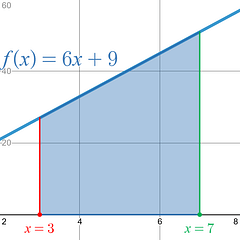Example 1: Definite Integral Power Rule
|
|
|||||
|
Step 1: Simplify and look for algebraic rewrites.
When looking at the first chunk Remind yourself that there is really an unwritten 1 for the power. That is what allows us to apply the power rule . |
|
||||
|
Step 2: Identify any term(s) that include variables raised to a power. Break the problem down into bitesize chunks based upon the + and – , and identify the antiderivative rule for each chunk (term).
Here you have 2 chunks. The first chunk, 6x , will be a power rule , and the second chunk, 9, is a constant. |
|
||||
|
Step 3: Take the antiderivativeof the variables raised to a power using the Recipe:Add 1 to the power; Divide by the new power.
Chunk 1: Power Rule Chunk 2: Constant Rule |
|
||||
|
Step 4 ( Definite Integral ONLY ): Evaluate the antiderivative result using the Top – Bottom method. |
|
||||
|
Final Result Meaning: Remember the Definite Integral will always provide you a definite value , and the Indefinite Integral provides you a family of solutions . |
The Net Area between the curve and the x-axis on the x-interval [ 3 , 7 ] is 156. Since the final result is positive, you know without even seeing the graph that there is more area above the x-axis than below it.
|
||||

